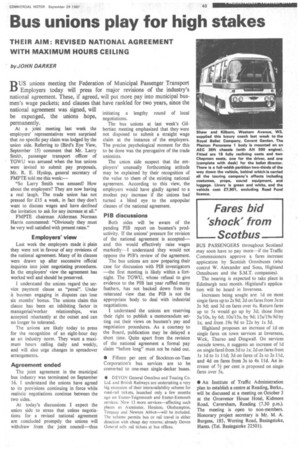Bus unions play for high stakes
Page 51

If you've noticed an error in this article please click here to report it so we can fix it.
THEIR AIM: REVISED NATIONAL AGREEMENT WITH MAXIMUM HOURS CEILING
byJOHN DARKER BUS unions meeting the Federation of Municipal Passenger Transport Employers today will press for major revisions of the industry's national agreement. These, if agreed, will put more pay into municipal busmen's wage packets; and clauses that have rankled for two years, since the
national agreement was signed, will be expunged, the unions hope, permanently.
At a joint meeting last week the employers' representatives were surprised that no specific pay claim was lodged by the union side. Referring to (Bird's Eye View, September 15) comment that Mr. Larry Smith, passenger transport officer of TGWU was amused when the bus unions were invited to submit pay proposals, Mr. R. E. Hyslop, general secretary of FMPTE told me this week:— "So Larry Smith was amused! How about the employers? They are now having a real laugh. The trade union has not pressed for £15 a week, in fact they don't want to discuss wages and have declined the invitation to ask for any increase at all."
FMPTE chairman Alderman Norman Harris commented: "Obviously they must be very well satisfied with present rates."
Employers' view Last week the employers made it plain they were not in favour of any revisions of the national agreement. Many of its clauses were drawn up after successive official inquiries into joint negotiating procedures. In the employers' view the agreement has worked well and should be preserved.
I understand the unions regard the service payment clause as "penal". Under it busmen engaging in disputes can lose six months' bonus. The unions claim this clause has been an inhibiting factor in managerial/worker relationships, was accepted reluctantly at the outset and can no longer be tolerated.
The unions are likely today to press for the recognition of an eight-hour day as an industry norm. They want a maximum hours ceiling daily and weekly, and will also urge changes in spreadover arrangements.
Agreement ended The joint agreement in the municipal bus industry was terminated on September 16. I understand the unions have agreed to its provisions continuing in force while realistic negotiations continue between the two sides.
At today's discussions I expect the union side to stress that unless negotiations for a revised national agreement are concluded promptly the unions will withdraw from the joint council—thus initiating a lengthy round of local negotiations.
The bus unions at last week's Gilbertian meeting emphasized that they were not disposed to submit a straight wage claim at the instance of the employers. The precise psychological moment for this to be done was the prerogative of the trade unionists.
The union side suspect that the employers' unusually forthcoming attitude may be explained by their recognition of the value to them of the existing national agreement. According to this view, the employers would have gladly agreed to a modest pay increase if the Unions had turned a blind eye to the unpopular clauses of the national agreement.
PIB discussions Both sides will be aware of the pending PIB report on busmen's productivity. If the unions' pressure for revision of the national agreement is accepted— and this would effectively raise wages markedly I understand they would not 'oppose the PIB's review of the agreement.
The bus unions are now preparing their case for discussion with PIB investigators —the first meeting is likely within a fortnight. The TGWU, whose refusal to give evidence to the PIB last year ruffled many feathers, has not backed down from its reiterated view that the PIE is not the appropriate body to deal with industrial negotiations.
I understand the unions are reserving their right to publish a memorandum setting out their views on busmen's pay and negotiation procedures. As a courtesy to the Board, publication may be delayed a short time. Quite apart from the revision of the national agreement a formal pay claim "before long" must not be ruled out.
• Fifteen per cent of Stockton-on-Tees Corporation's bus services are to be converted to one-man single-decker buses.
• DEVON General Omnibus and Touring Co. Ltd. and British Railways are undertaking a very big extension of their interavailability scheme for road-rail tickets, launched only a few months ago on Exeter-Teignmouth and Exeter-Exmouth services. Now 13 more services—affecting such places as Axminster, Honiton, Okehanapton, Torquay and Newton Abbot—will be included. The scheme permits bus or rail travel in either direction with cheap day returns; already Devon General sells rail tickets at bus offices.




































































































































































